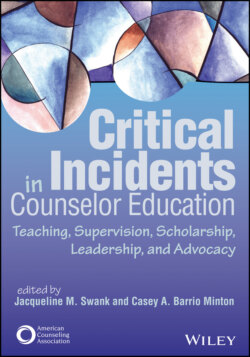Читать книгу Critical Incidents in Counselor Education - Группа авторов - Страница 17
2014 ACA Code of Ethics Standards Addressed
ОглавлениеF.7.a. Counselor Educators
F.9.a. Evaluation of Students
• • •
During his first semester teaching in a counselor education program, Professor O had been very excited for every class. He had spent hours preparing and updating handouts, developing experiential activities, and reviewing videos to show in class. On the day of class, he would review assigned readings to make sure he was up to date on the material. Although he did not spend nearly as much time preparing for courses currently, he continued to be enthusiastic about teaching and was very well prepared to engage with students. He hoped that students shared his enthusiasm and were equally prepared to engage in a shared learning experience.
Professor O primarily adhered to a humanistic (C. R. Rogers, 1969) and experiential (Kolb, 1984) teaching philosophy. He tried to facilitate warm, empathic, genuine, and trusting relationships with students. He attempted to facilitate an open environment in which students felt comfortable sharing their perspectives and enjoyed inquiring about course topics within a learning community. Professor O viewed student learning as an active process that included both cognitive and affective components. He believed students learned best by doing, reflecting, and trying new approaches.
On the first day of class, Professor O reviewed the syllabus and discussed requirements, including reading and assignments. He explained that he would not lecture directly from the book and expected that students would read and be prepared to discuss the content. Professor O emphasized his belief that active learning was most helpful and class was most enriching when everyone was engaged. Professor O liked to start each class with a check-in and a brief discussion of students’ perceptions of the topic. For example, he might ask about personal or professional experiences related to the topic or how the topic related to other aspects of counseling. In the first few weeks of class, he often facilitated brainstorming activities to engage the class in discussion.
One particular semester, Professor O taught the course Critical Issues in School Counseling. The course was an overview of current issues and concerns school counselors encounter. The content for the class session included environmental risk factors K–12 students face related to academics and overall well-being. Professor O started class by asking students to share some thoughts about the reading. He inquired about which risk factors surprised them most and how they believed school counselors could help prevent student distress related to them. Although he typically started class this way, the discussion during this class related more closely to concepts covered in the required reading.
After about a minute of observing the glazed looks on students’ faces, Professor O realized most were unsure about how to answer the question because they could not recall specific risk factors in the reading. In an attempt to encourage participation, he half-jokingly reminded them “Participation is 15% of your grade—let’s make sure we all get our points today.” A few of the students laughed nervously while others continued to stare with blank faces. After a few more moments of silence, he asked, “Is any of this ringing a bell?” He still did not get a response. It became clear that students either had not completed the assigned readings ahead of time or did not comprehend the material well enough to share their perspectives.
Professor O was confused because the discussion had been rather lively in previous class meetings. When it became clear nobody was going to volunteer, he asked students what was keeping them from sharing. After another moment of silence with no real response, Professor O blurted out, “Did anybody read?” He noticed guilty looks on students’ faces as some reluctantly shook their heads. He then asked, “So what’s going on? Why aren’t we reading?” Finally, a more vocal student jumped in and explained, “We just finished a big paper that was due yesterday for another class, and we have an exam in our class tomorrow. We have just been really busy this week.” Although the student was not speaking on behalf of everyone, there appeared to be somewhat of a consensus among the students.
Professor O’s genuine internal reaction was to be a bit offended. He had spent time planning his class, and he felt disappointed that students were not invested in his class. Professor O was careful not to shame the students. Instead, he tried to empathize with them: “You are overwhelmed this week. Sometimes in graduate school things are piled on all at once and it is hard to get to everything. Reading can be hard when it’s not directly tied to a grade or assignment.” He spent some time talking about how reading ahead is imperative to having fruitful class discussions. Professor O eventually moved on to the content of the class. Students were engaged in the discussion throughout the rest of the class when prompted or when asked to work in small groups.
